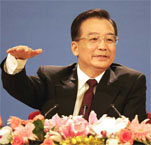China frets over inflation, currency policy
 Beijing- Premier Wen Jiabao ended China's annual parliament in mid-March with a surprisingly gloomy outlook for 2008, despite the nation continuing its breakneck economic growth.
Beijing- Premier Wen Jiabao ended China's annual parliament in mid-March with a surprisingly gloomy outlook for 2008, despite the nation continuing its breakneck economic growth.
"I am afraid that this year might become the most difficult one for the Chinese economy," Wen said after the parliament endorsed his economic policies designed to curb inflation and promote more sustainable growth.
"The biggest concern is price rises," Wen told reporters. "This has made the lives of people, particularly low income groups, more difficult."
The government's long-term policy to stimulate domestic demand and reduce China's reliance on its export-oriented industries is also proving difficult to achieve, Liu Lingling, an economist at Beijing's elite Qinghua University, told Deutsche Presse-Agentur dpa.
"The prices of raw materials and labour are much lower than they should be," Liu said.
Several factors are hampering government efforts to raise domestic demand beyond the affluent cities of the east and south.
The low wages for ordinary jobs limit the purchasing power of most Chinese and food-price inflation makes consumers less likely to spend on non-essential items, while many are scared off by soaring prices in the over-valued property market.
"Chinese people haven't revolted because they were too poor in the past and so they were easy to satisfy with little money," Liu said.
"But 30 years have passed (since China launched economic reforms), and people have begun to demand wage rises," she said.
The government has moved to control prices of grain, pork, cooking oil and other key commodities amid the rising inflation, which hit an 11-year high of 8.7 per cent in February.
Many Western critics say that China's suppression of the value of its currency against the dollar is making its exports cheaper, and fuelling an annual trade surplus of more than 200 billion dollars with the United States alone.
China could help to control inflation and reduce the trade surplus by allowing the renminbi to appreciate faster, the critics argue. But Liu disagrees.
"If the renminbi rises faster, it will pull the global economy more," she conceded.
"China will buy more and other countries could export more to us ... (and) Chinese may invest more in foreign countries."
But Liu said government attempts to control inflation have had "little effect" during gradual appreciation of the currency, which has gained more than 10 per cent against the dollar over the last two years.
Prices of crude oil and other raw materials in the international market are rising faster than the Chinese currency, "so you get no benefit from the renminbi's appreciation," she said.
If China's trade surplus does fall this year, that could also reduce its demand for raw materials and hit economic growth in South-East Asia and countries such as Brazil, Liu said.
A recent report by economists from People's University in Beijing estimated that a 1-per-cent rise in global energy prices adds an extra 0.1 percentage point to China's consumer price inflation.
Slowing economic growth worldwide, the rise in the dollar against other currencies, and the effect of the US credit crunch on Chinese capital markets "will add more uncertainties to China's economic outlook this year," the report said.
The report forecast gross domestic product (GDP) growth of 10.5 per cent this year and state media quoted economist Liu Fengliang, one of the authors, as saying there were "signs of relief" from the risk of overheating.
The World Bank in February forecast slightly slower but "solid" economic growth of 9.6 per cent for China this year, following 11.4-per cent growth in 2007, the highest rate since 1994.
"The slowdown in the global economy should affect China's exports and investment in the tradable sector," David Dollar, the bank's China director, told reporters.
"However, the momentum of domestic demand should remain robust and a modest global slowdown could contribute to rebalancing of the economy," Dollar said.
Despite the ruling Communist Party encouraging private enterprise and foreign investment since the early 1980s, it is still trying to maintain credibility with ordinary people through the price controls and measures to help poor rural areas, redundant state workers and other social groups.
Government price subsidies for coal, electricity, gas, food and other commodities, which are relics of 60 years of tight state planning, continue to distort the economy, Liu said.
"The change in the mode of production, for every country in the world, takes decades," she said.
"But our government promised to restrain inflation in a few years, as well as to maintain economic growth. It is very difficult." (dpa)